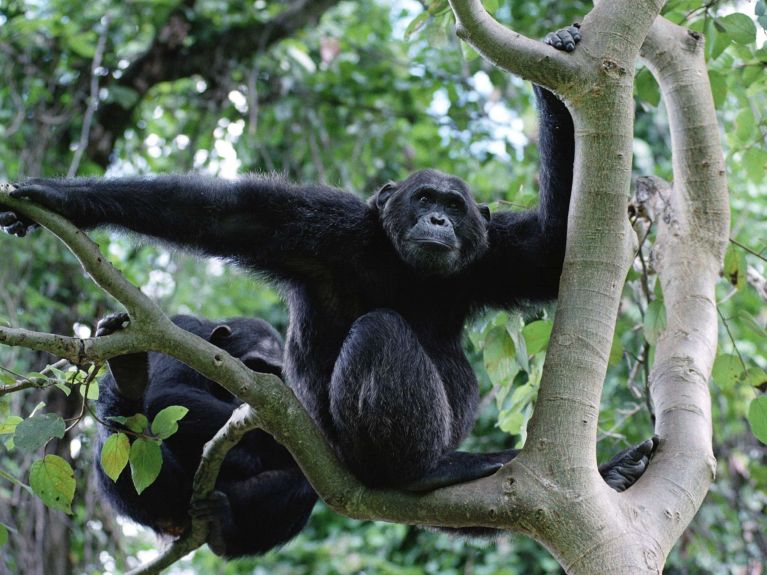Conducting research into zoonotic diseases – promoting health
It is not just since the COVID-19 pandemic that zoonotic diseases have been an issue. A group of German and international researchers is investigating them in West Africa.

Keep your distance, observe hygiene rules, wear a mask: these were the fundamental principles (“Hands. Face. Space”) introduced in Germany during the COVID-19 pandemic. For Professor Fabian Leendertz, these principles have long been essential: he is a veterinarian responsible for health issues on the Taï Chimpanzee Project (TCP) in Côte d'Ivoire. Dedicated to investigating the biology of chimpanzees, the project has been running in Taï National Park for almost 45 years. It is headed by Dr Roman Wittig, Research Director at the Institut des Sciences Cognitives at the Centre National de la Recherche Scientifique in Lyon and a staff member at the Max Planck Institute for Evolutionary Anthropology in Leipzig. The TCP was taken on by this institute when the behavioural scientist Professor Christophe Boesch, who originally set it up with his wife, became Director of the Primatology Department at the end of the 1990s. It was through Boesch that Leendertz came to join the project at that time, too. Boesch told him that large numbers of chimpanzees were dying, but he didn’t know why. Carrying out research in Côte d'Ivoire, Leendertz then investigated the causes of death, also in collaboration with the Robert Koch Institute (RKI).
Infection research yields valuable insights
Firstly, he found that the chimpanzees were dying of respiratory diseases. “What we were seeing here were human pathogens being transmitted to the animals,” says Leendertz, who found cold viruses that were quite harmless to humans but potentially fatal for monkeys, for example. “That was quite a bombshell: after all, behavioural researchers are actually there to protect the animals, not to endanger them.” But the TCP was able to show that due to the fact that poachers were kept away, for example, the protection offered by researchers is in fact greater that the risk they pose to the chimpanzees. “We were also able to demonstrate that action can be taken to minimise the risk of disease transmission,” says Leendertz. “In 2008 we introduced basic hygiene principles (“Hands. Face. Space.”) for handling the chimpanzees.” Hygiene measures are now on the agenda of all projects involving great apes. Leendertz also discovered a new anthrax pathogen in chimpanzees that can pose a risk to humans, too.

Why zoonotic diseases are dangerous
Zoonotic diseases are infectious diseases that are caused by bacteria, parasites, infectious proteins, fungi or viruses and can be transmitted reciprocally between animals and human beings. AIDS, Lyme disease, Ebola, measles, MERS, bird flu, West Nile fever, Zika virus: there are numerous examples. COVID-19 is one of them, and as we have seen recently: some zoonotic diseases have the potential to trigger pandemics. But application of the “Hands. Face. Space” rules in the TCP prevented chimpanzees from becoming infected with SARS-CoV-2, says Leendertz.
International cooperation in Taï National Park
In addition to behavioural researchers, there are always one or two veterinarians working in Taï National Park. The Centre Suisse de Recherches Scientifiques in Abidjan is responsible for managing the TCP in Côte d'Ivoire. Local employees from the surrounding villages record behavioural data on the chimpanzees and report anything they notice with regard to the animals’ health. Over the years, international students, Ivorian doctoral students and laboratories, and Bouaké University Hospital have likewise helped the researchers gain valuable insights. “The project has shown us that we humans are a very significant reservoir of relevant pathogens for endangered animal species such as chimpanzees,” says Leendertz. But he believes the apes have an indicator function, too: after all, they are genetically very similar to human beings. “Anything that makes a chimpanzee sick or kills it is likely to be a relevant pathogen for us humans.”
The link between the health of human beings and that of the environment
The interdisciplinary One Health concept recognises the close interconnection between the health of humans, animals and the environment. Having previously worked at the RKI for many years, Leendertz is the founding director of the Helmholtz Institute for One Health in Greifswald and has been Professor of One Health at the university there since 2021. The fact that humans are encroaching further and further into animals’ habitat can favour the spread of zoonotic diseases. “Close collaboration with anthropologists and local communities also contributes to prevention, enabling us to show where there are risks based on the data we collect.” Leendertz is aware that sensitivity is needed when it comes to issues such as traditional hunting that has been practised for generations.
Supporting biodiversity and combating zoonotic diseases
One particular problem as he sees it is the commercial hunt for “bushmeat”, i.e. all edible wild animals. This has nothing to do with traditional hunting to meet personal needs, says Leendertz. Animal welfare activists also highlight the risks involved in wildlife trading. “It weakens biodiversity and animal health, thereby impairing the resilience of entire habitats,” says Robert Kless, Country Director Germany with the International Fund for Animal Welfare (IFAW). He regards this as one of the causes behind the spread of zoonotic diseases. “Humans are encroaching further and further into the habitats of wild animals and destroying them. Whether to obtain resources, for example by cutting down forests, or to obtain meat or trophies from wild animals.” According to Kless, the COVID-19 pandemic has made European policymakers more aware of the dangers of wildlife trafficking. “It will be vital to maintain this awareness,” says Kless.